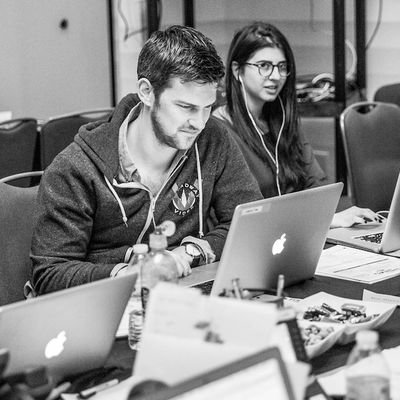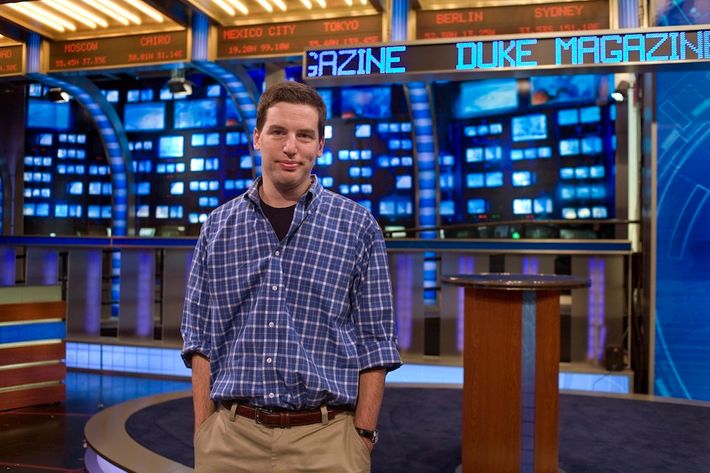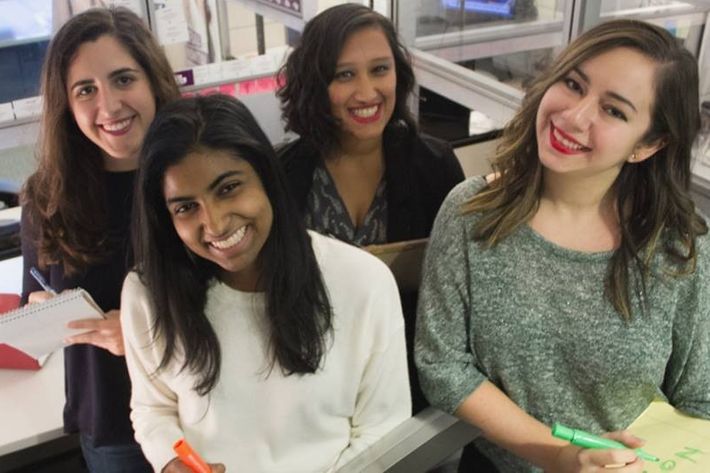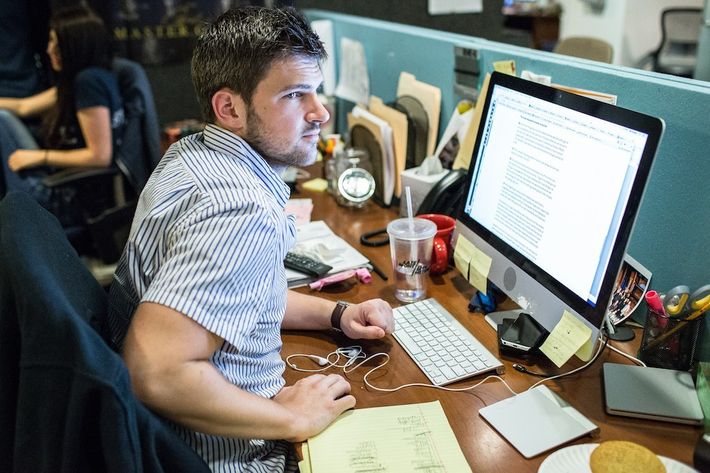
It seems like nobody can agree on whether to take comedy very lightly or very seriously. People get firmly locked in their respective ideological camps, proclaiming either that comedy is powerful because itŌĆÖs meaningless or that itŌĆÖs powerful because it contains more meaning than anything else. What the debaters always seem to ignore is just how broadly theyŌĆÖre defining something as wide-ranging as comedy. Some comedy is very meaningful. Some comedy is pretty much meaningless.
A larger problem stems from this. Late night comedy now has a much larger impact on audiences than it had just over a decade ago, thanks in large part to The Daily Show and all that it has spawned. It has gradually become a more substantial source for insight about whatŌĆÖs happening in our world; itŌĆÖs become an outlet for news and valuable information.
For most of the history of televised media, comedy and news were not so tightly woven that a perfect adherence to factuality was a real concern. And the increased intersection of news and comedy has led to mixed feelings, mostly related to the fact that, until recently, when late night comedy and the news did intersect, it was overtly trivial. For years, the closest thing America had to what it has now was Saturday Night LiveŌĆÖs Weekend Update, which was simply comedians reading headlines and providing either puns or comedically deliberate misinterpretations. The idea that anybody could gain any practical and informative news from late night comedy shows was laughable in itself.
But now, regardless of whether or not you draw your information directly from late night comedy shows, it is absolutely one of the channels of information that makes the most lasting impression. How often have you heard or even personally said something along the lines of ŌĆ£Did you see John OliverŌĆÖs bit about such-and-such? It was so good. I donŌĆÖt remember how it goes, but itŌĆÖs great.ŌĆØ Statements like that speak to one of comedyŌĆÖs most salient features: its direct appeal to emotions. Mixed with actual, well-researched information, that makes comedy one of the most lasting and enduring means of transmitting information.
With the rise of The Daily Show, it became apparent that Americans had grown wary of standard news media. Then and now, the news had a tendency to be exceedingly dramatic and theatrical. Many outlets even appeal transparently to fear. Jon Stewart offered Americans the opportunity to take in the news without it leading to mini panic attacks, and in the atmosphere that immediately followed 9/11, it was comforting to be able to laugh at news. As Anthony Jeselnik has said, ŌĆ£No matter how terrible something is, if you can find a way to laugh at it, then things are going to be all right.ŌĆØ
Adding to the confusion, Stewart and his team have always been eager to respond to criticism from other media outlets by underlining the unprofessional character of The Daily Show. After all, the show did begin by generally mocking the absurdity of political theater, especially as presented to us in the form of news. It wasnŌĆÖt supposed to be a channel for the news. What people learned in the course of enjoying The Daily Show was practically incidental.
But no matter how much people claim to regard traditional news media as more worthy of their trust, itŌĆÖs important to appreciate how much more they seem to resonate with late night comedy segments. Whether or not people agree with them, they stick; they make their way into traditional news media and social media, and they become the avenue through which many ultimately focus on the issue at hand. So it makes sense that we should be as concerned with factuality and quality of research in our late night comedy segments as we are with factuality and quality of research in traditional news media.

Adam Chodikoff is a senior producer at The Daily Show, where heŌĆÖs worked now for 21 years. So thatŌĆÖs to say: heŌĆÖs been there since the very beginning. During the two and a half years that Craig Kilborn hosted the show, Chodikoff told me ŌĆ£it was much more [about] pitching ideas for jokes ŌĆ” The focus of the show [became] much more political when Jon took over.ŌĆØ Chodikoff doesnŌĆÖt have an official title that brands him as the researcher or fact checker, but functionally he is the pointman for any and all fact checking and researching at The Daily Show. In July of 2015 he was even a keynote speaker at the second Global Fact-Checking Summit.
Once the show started to become more politically oriented, it became much more imperative that each segment come into being through a process of intense fact checking and researching. These were what Chodikoff referred to as ŌĆ£JonŌĆÖs adamantium shield.ŌĆØ Stewart and his team were doing comedy in a new format that landed in deeply personal territory for many powerful people. Thus, in order to adequately prepare for whatever backlash the show might face, one thing was absolutely crucial: credibility. ŌĆ£I want it on my gravestone,ŌĆØ said Chodikoff. ŌĆ£Without credibility, the jokes mean nothing.ŌĆØ
Will Storey, the research manager for Late Night with Seth Meyers, shared the same sentiment when he pointed out that a joke is ŌĆ£only funny if itŌĆÖs based in reality and if the audience can connect that reality to absurdity.ŌĆØ Storey also addressed the particularly novel political environment that we find ourselves in. ŌĆ£Reality is getting pretty absurd these days,ŌĆØ he said, ŌĆ£and that provides a lot more leeway.ŌĆØ
So, practically speaking, how does one go about ensuring such credibility? Well, as you might have guessed, extreme amounts of reading and a deep appreciation for detail. For example, amid the panic of the dismantling of the Affordable Care Act last month, one of the lines we all heard repeated most frequently was that ŌĆ£24 million people are going to lose their health insurance.ŌĆØ While The Daily Show was developing its take on the subject, Chodikoff made sure to keep the team in line with factual accuracy. ŌĆ£What the Congressional Budget Office said,ŌĆØ explained Chodikoff, ŌĆ£was that, of the 24 million people, some people, freed of the mandate, will freely choose not to have health insurance. So itŌĆÖs wrong to say that ŌĆś24 million peopleŌĆÖ will ŌĆśloseŌĆÖ their health care. It might be in the millions, but itŌĆÖs not the entire 24 million.ŌĆØ
In addition to being widely read and constantly up-to-date on all the pressing issues of the day, it also helps to have contacts who are deeply familiar with specific topics. Chodikoff has built a collection of such contacts over the past 21 years. When it comes to understanding the details of a topic that would normally require years of careful study, he can draw on his ŌĆ£network of experts who are nonpartisan, the top of their fields, and who are not affiliated with partisan think tanks.ŌĆØ

And indeed, independent professionals are necessary to prevent the show from falling into the echo chamber in which we all sometimes find ourselves. When it comes to preventing such an echo chamber from coloring a showŌĆÖs response to an event, Naureen Khan and Ali Elkin of Full Frontal with Samantha Bee emphatically stressed the importance of remaining skeptical.
Elkin, the showŌĆÖs fact checker, warned that ŌĆ£statistics and polls can very easily be misleading.ŌĆØ Fortunately, ElkinŌĆÖs background has provided her with the experience to sort out what polls can and canŌĆÖt be trusted. ŌĆ£One nice thing about having a journalism background is that when youŌĆÖre looking at poll data, you have more tools at your disposal to know if this was a reliable poll, if the sample size was big enough, or if it was done over the phone or over the internet. ThereŌĆÖs a lot to take into consideration.ŌĆØ
Will Storey also comes from a journalism background. After studying broadcast journalism and political science at Northwestern, he worked as a researcher and fact checker for Pulitzer Prize-winning columnist Maureen Dowd for three years. With that experience, Storey agreed that deadlines and tight turnarounds present a number of difficulties for thorough research. ŌĆ£ThereŌĆÖs never really an ŌĆśendŌĆÖ to research,ŌĆØ he said. ŌĆ£You do what you can in the time you have. There are so many late developments that eat into the time [when] you would normally be digging into the background of a particular person or issue.ŌĆØ
Khan, the senior researcher for Full Frontal, spent several years as a reporter for Al Jazeera, and her time as a reporter also left her intimately familiar with how pressure from deadlines can lead to significant informational gaps. ŌĆ£If you see a one-line paragraph at the end of the story that says ŌĆśsuch-and-such was not immediately available for comment,ŌĆÖŌĆØ she said, ŌĆ£that typically means the reporter was being pressured to submit the piece and they telephoned the person 30 seconds before sending it to their editor.ŌĆØ
Tighter deadlines arenŌĆÖt the only obstruction one faces in such a position. As Storey also observed, ŌĆ£IŌĆÖm old enough to remember a time when news generally stopped at around 5:00pm. The constant deluge of breaking news later and later in the day makes keeping things current quite difficult ŌĆō who knows what will happen between the time we tape and the time we air.ŌĆØ
One thing that Storey, Khan, and Elkin all emphasized during our conversations was the importance of context. ŌĆ£Context is everything,ŌĆØ Storey said. ŌĆ£Using quotes and clips properly should be a priority for anyone in the media in general.ŌĆØ

So what tools do the experts employ to avoid these pitfalls? Storey relies largely upon LexisNexis for much of the fact checking at Late Night with Seth Meyers, along with databases like Gale and EBSCO. And in times like our own, Khan additionally praised the advent of TwitterŌĆÖs advanced search function for providing context.
Interestingly enough, while Chodikoff also relies on LexisNexis, after 21 years in his position at The Daily Show, he recommends a far more old-fashioned tool: The World Almanac. ŌĆ£It comes out every year. You can buy it at a bookstore for 12 bucks. ItŌĆÖs my most helpful tool.ŌĆØ Though thatŌĆÖs not to say heŌĆÖs averse to something more modern. ŌĆ£ThereŌĆÖs got to be a way to improve the almanacŌĆöhave it beamed directly into my brain.ŌĆØ
Pending Elon MuskŌĆÖs Neuralink, however, itŌĆÖs likely that fact checking and research will continue to unfold as it has for decades: in the hands of experienced professionals like Chodikoff, Khan, Elkin, and Storey, who are just crazy enough to truly enjoy absorbing the veritable mountain of information required to produce something trustworthy and memorable.
Phil Stamato lives and writes in New York, where he may also be seen standing up and telling jokes. If youŌĆÖve read this far you are legally required to follow him on Twitter.

